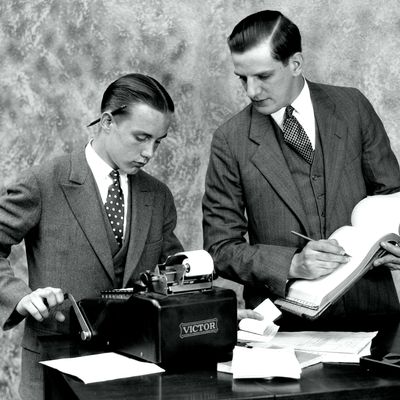
They say comparison is the thief of joy, and this, as it turns out, is one cliché that has a raft of empirical evidence backing it up. But there is another truth about social comparison: It’s pretty much inevitable, so you may as well learn to use it to your advantage, say Adam Galinsky and Maurice Schweitzer, both social psychologists and co-authors of the new book Friend and Foe: When to Cooperate, When to Compete, and How to Succeed at Both.
In their book, Galinsky and Schweitzer argue that social comparison is an innate human tendency, and, whether it’s the wisest move or not, it’s a big part of the way we determine our own level of happiness. Even monkeys judge what they’ve got by taking a peek at what the monkey next door is getting, according to a classic study by Emory University scientist Frans de Waal. De Waal trained capuchin monkeys to essentially use stones as a kind of currency, exchanging one for a nice cucumber slice. The monkeys were perfectly happy with this arrangement, until de Waal started giving some, but not all, of the monkeys a sweet, juicy grape instead of the cucumber. (Like humans, monkeys would much rather have something sweet than a boring vegetable.)
“Upon seeing this inequity, the monkey who was offered the regular cucumber went, well, apeshit,” Galinsky and Schweitzer write. The monkeys who perceived themselves as receiving a lesser deal became visibly upset, refusing to pay for the cucumber or sometimes throwing the slice back in the experimenter’s face. “What this experiment demonstrates,” the authors write, “is that our evolutionary ancestors did not evaluate their outcomes in isolation; rather, they evaluated outcomes in a comparative process.”
For a human example of this phenomenon, Galinsky and Schweitzer tell the story of a man named Scott Crabtree, who had dutifully climbed the corporate ladder at his company, steadily earning incremental raises. He was fine with this — until, that is, a just-out-of-college kid was hired and immediately began earning almost the exact same salary as him, a figure that had taken Crabtree decades to earn. The infuriating comparison made him so unhappy that he soon left the company, where he’d happily worked for many years. “We are hardwired to engage in comparisons,” Schweitzer said in an interview with Science of Us. “That is, we can’t get away from it, and we’re doing it to try to make sense of our world. Do I make enough money? Do I need to update my kitchen? Do I need a new car? Are my kids doing well? It’s almost impossible to make those assessments objectively. So instead, we turn to comparisons.”
So if comparison is unavoidable, then, the authors argue, you’d best learn how to work with it. Because rivalries, of course, can be motivating. Schweitzer and Galinsky point to a study by New York University psychologist Gavin Kilduff, who found that people tend to perform better when their rivals are present, as compared to their performance against random strangers. More specifically, he analyzed the race results of local running clubs and found that people tended to run faster if their rival was also racing that day; multiple rivals meant the runner sped through the course even faster.
Comparison can be motivating, but it can also make you miserable. The best part of Schweitzer and Galinsky’s book, by the way, is the authors’ refusal to argue for one of these truths over the other. Instead, they recognize that competitive and cooperative feelings can and do co-exist within the same person, and neither feeling is necessarily superior. It’s learning when to use each feeling that counts. Take a classic study in psychology on Olympic medalists, recounted in the book: Silver medalists tend to be miserable because they’re comparing themselves to the gold medalists; bronze medalists, on the other hand, are comparing their outcome to those who came in fourth and beyond, and so they tend to be more pleased with themselves than the silver medalists — even though the silver-winners technically beat them.
To that end, Galinksy and Schweitzer write that “when it comes to using social comparison to boost your own motivation, here is the key rule to keep in mind: Seek favorable comparisons if you want to feel happier, and seek unfavorable comparisons if you want to push yourself harder.” You may not be able to quit your social-comparison habit, but you can learn to make it work for you.




